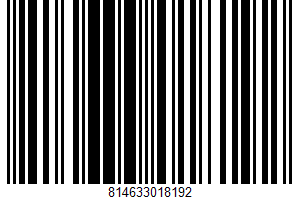Yogurt Smoothie - 259 calories
Manufacturer Other
Product Information and Ingredients
Yogurt Smoothie is manufactured by Other with a suggested serving size of 8 OZA (240 ml) and 259 calories per serving. The nutritional value of a suggested serving of yogurt smoothie includes 24 mg of cholesterol, 0 mg of sodium, 48 grams of carbohydrates, 6 grams of dietary fiber, 38 grams of sugar and 8 grams of proteins.
The product's manufacturer code is UPC: 814633018192.
This product is high in sugars.
Calories from fat: a total of 15.67% of the calories in the suggested servig of this product come from fat.
Sugars 365% of DV
A serving of 8 OZA (240 ml) of yogurt smoothie has 365% of the recommended daily intake of sugars.
Ingredient List
- Cream
- Skim Milk
- Sugar
- Water
- Mango Puree
- Nonfat Dried Milk
- Polydextros (fiber)
- Modified Food Starch
- Gelatin
- Tricalcium Phosphate
- Natural And Artificial Flavors
- Mono And Diglycerides
- Pectin
- Citric Acid
- Sodium Benzoate
- Potassium Sorbate
- Artificial Color (yellow #5 And Red #40)

Nutrition Facts
Serving Size 8 OZA (240 ml)
| Amount Per Serving | ||
|---|---|---|
| Calories 259 | Calories from Fat 41 | |
| % Daily Value* | ||
| Total Fat 4.5g | 17% | |
| Saturated Fat 3.5g | 42% | |
| Trans Fat 0g | ||
| Cholesterol 24mg | 19% | |
| Sodium 0mg | 0% | |
| Total Carbohydrate 48g | 38% | |
| Dietary Fiber 6g | 58% | |
| Sugars 38g | ||
| Protein 8g | ||
| Vitamin A 10% | Vitamin C 5% |
| Calcium 55% | Iron 0% |
* Percent Daily Values are based on a 2,000 calorie diet.
Nutrition Facts
Serving Size 100g (about 3.52 oz)
| Amount Per Serving | ||
|---|---|---|
| Calories 108 | Calories from Fat 17 | |
| % Daily Value* | ||
| Total Fat 1.9g | 7% | |
| Saturated Fat 1.5g | 18% | |
| Trans Fat 0g | ||
| Cholesterol 10mg | 8% | |
| Sodium 52mg | 5% | |
| Total Carbohydrate 20g | 16% | |
| Dietary Fiber 2.5g | 24% | |
| Sugars 16g | ||
| Protein 3g | ||
| Vitamin A 4% | Vitamin C 2% |
| Calcium 23% | Iron 0% |
* Percent Daily Values are based on a 2,000 calorie diet.
Yogurt Smoothie Nutritional Value
| Nutrient | Suggested Serving 8 OZA (240 ml) | Standard Serving 100g |
|---|---|---|
| Energy | 259 kcal (31%) | 108 kcal (13%) |
| Protein | 7.99 g (38%) | 3.33 g (16%) |
| Total Lipid (fat) | 4.51 g (17%) | 1.88 g (7%) |
| Carbohydrate, By Difference | 48 g (38%) | 20 g (16%) |
| Fiber, Total Dietary | 6 g (58%) | 2.5 g (24%) |
| Sugars, Total | 37.99 g (365%) | 15.83 g (152%) |
| Calcium, Ca | 300 mg (55%) | 125 mg (23%) |
| Iron, Fe | 0 mg (0%) | 0 mg (0%) |
| Potassium, K | 374 mg (19%) | 156 mg (8%) |
| Sodium, Na | 125 mg (13%) | 52 mg (5%) |
| Vitamin C, Total Ascorbic Acid | 1.2 mg (5%) | 0.5 mg (2%) |
| Vitamin A, Iu | 199 IU (10%) | 83 IU (4%) |
| Fatty Acids, Total Saturated | 3.5 g (42%) | 1.46 g (18%) |
| Fatty Acids, Total Trans | 0 g (0%) | 0 g (0%) |
| Cholesterol | 24 mg (19%) | 10 mg (8%) |
Calories Burn off Time
How long would it take to burn off Other Yogurt Smoothie with 259 calories? A brisk walk for 56 minutes, jogging for 26 minutes, or hiking for 43 minutes will help your burn off the calories in yogurt smoothie.
Burn off time varies based on your weight, physical activity and exercise intensity. The following physical activity table contains an estimated burn off time for a person weighting 154 lbs.
| Physical Activity | Burn Off Time |
|---|---|
| Bicycling - 10 mph or less | 54 minutes |
| Dancing | 47 minutes |
| Golfing | 47 minutes |
| Hiking | 43 minutes |
| Light Gardening | 47 minutes |
| Stretching | 86 minutes |
| Walking - 3.5 mph | 56 minutes |
| Weight Training - light workout | 72 minutes |
| Aerobics | 32 minutes |
| Basketball | 35 minutes |
| Bicycling - 10 mph or more | 26 minutes |
| Running - 5 mph | 26 minutes |
| Swimming | 30 minutes |
| Walking - 4.5 mph | 34 minutes |
| Weight Training - vigorous workout | 35 minutes |
Footnotes
Percent daily values are based on a 2,000 calorie reference diet. Factors like age, gender and level of physical activity may affect your daily required values.
The editorial opinions regarding food value or quality in this website are given without warranty, and are not intended to replace medical advice or a nutritionist guidance.
Dietary Recommendations
A healthy eating pattern that accounts for all foods and beverages within an appropriate calorie level could help achieve and maintain a healthy weight and reduce the risk of chronic disease. Healthy eating habits include the following:
- Vegetables from all subgroups, including dark, green, red and orange vegetables and also beans and peas
- A variety of whole fruits
- Grains with at least half of which are whole grains
- Low or fat free dairy products, including milk, yogurt, cheese and/or fortified soy beverages
- Protein foods, including seafood, lean meats and poultry, eggs and nuts
- Oils with limited amounts of saturated fats and trans fats, added sugars, and sodium
